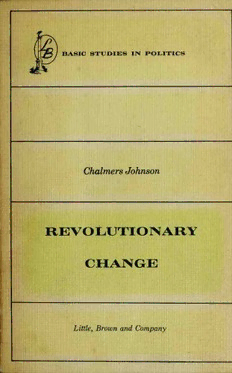Table Of ContentBASIC STUDIES POLITICS
IIV
Chalmers Johnson
REVOLUTIONARY
CHANGE
Little, Brown and Company
Digitized by the Internet Archive
2012
in
t
http://archive.org/details/revolutionarychaOOjohn
Revolutionary
Change
BASIC STUDIES IN POLITICS
Under the Editorship of
SHELDON WOLIN
S.
University of California, Berkeley
CHALMERS JOHNSON
Department ofPoliticalScience
University of California,Berkeley
Revolutionary
Change
LITTLE, BROWN AND COMPANY
Bostonand Toronto
COPYRIGHT © I966 BY LITTLE, BROWN AND COMPANY (iNC.)
ALL RIGHTS RESERVED. NO PART OF THIS BOOK
MAYBE REPRODUCED INANYFORM WITHOUT
PERMISSIONIN WRITING FROM THEPUBLISHER.
LIBRARY OF CONGRESS CATALOG CARD NO. 66-26489
FIRST PRINTING
Publishedsimultaneously in Canada
by Little, Brown & Company {Canada) Limited
PRINTED IN THE UNITED STATES OF AMERICA
F.oreword
Like so many areas of human knowledge to-
day, the study of politics and political institutions is undergoing
significant changes. A quarter-century ago only a few voices
challenged the prevailing consensus regarding the methods of
political science, the choice of problems, and the relative weight
assigned to the "factors" shaping political events, actions, and be-
havior. Since then a revolution of uncertain proportions has oc-
curred, one that has been variously described as "the behavioral
movement" or "social science." It has visibly altered the climate
of political science and it has deeply affected the outlook of the
No
political scientist. longer does he believe that political science
is a self-contained field. It has become second nature for him to
utilize methods, concepts, and data drawn from a wide range of
academic disciplines, such as sociology, psychology, and eco-
nomics.
A
marked self-consciousness about methods of inquiry charac-
terizes much of the contemporary literature, whereas thirty years
ago only a few political scientists were troubled by this concern.
Today's political scientist is receptive to quantitative techniques,
eagerto emphasize measurement, prepared to devise complex clas-
v
vi Foreword
sifications of empirical data, ready to experiment with abstract
models, and engrossed with the intricacies of preparing question-
naires and organizing surveys of public opinion. These changes
in method have also affected the outlook and the language of po-
litical science. Where his predecessors talked of "comparative
government," he is apt to talk of "comparative political systems";
where they referred to "the process of government," he prefers
to examine "the theory of decision-making"; and where they
spoke simply of "political theory," he will, more often than not,
insist on a distinction between "normative theory" and "empirical
theory," and depending on his candor or concerns, will assert that
his main interest lies with the latter. It is perhaps inevitable that a
moderate reaction should setin and that questionsshould be raised
among political scientists about whether they have not gone too
far and too fast. There is an uneasiness that some settled issues
ought to be reopened; that important features of politics have
been ignored; that questions of choice and value have to be re-
stored to a central position; and that the wonder of politics has
been lost amidst the preoccupation with abstractions, graphs, and
mathematical tables.
In the light of these changes and uncertainties there is good
reason for political scientists and political theorists to reflect on
the changing nature of their field of study and to report to a less
specialized, but no less interested, audience how political events,
practices, and behavior appear to the contemporary political sci-
entist; what way or ways of looking at these matters he has found
most useful and fruitful; and what problems he considers to be
genuine and important.
This series of books was designed for such a purpose. The au-
thors do not attempt to provide simply a digest of relevant facts,
but to offer reflections and systematic analyses of the more sig-
nificant and interesting areas of political science and political
theory. Some concentrate upon familiar topics, such as federalism
and political parties, but they seek to suggest the theoretically
interesting problems raised by these traditional themes. Other
studies, such as those dealing with political theory and ideology,
proceed on a more theoretical plane, but with the explicit inten-
tion of indicating their relevance to the empirical concerns of

